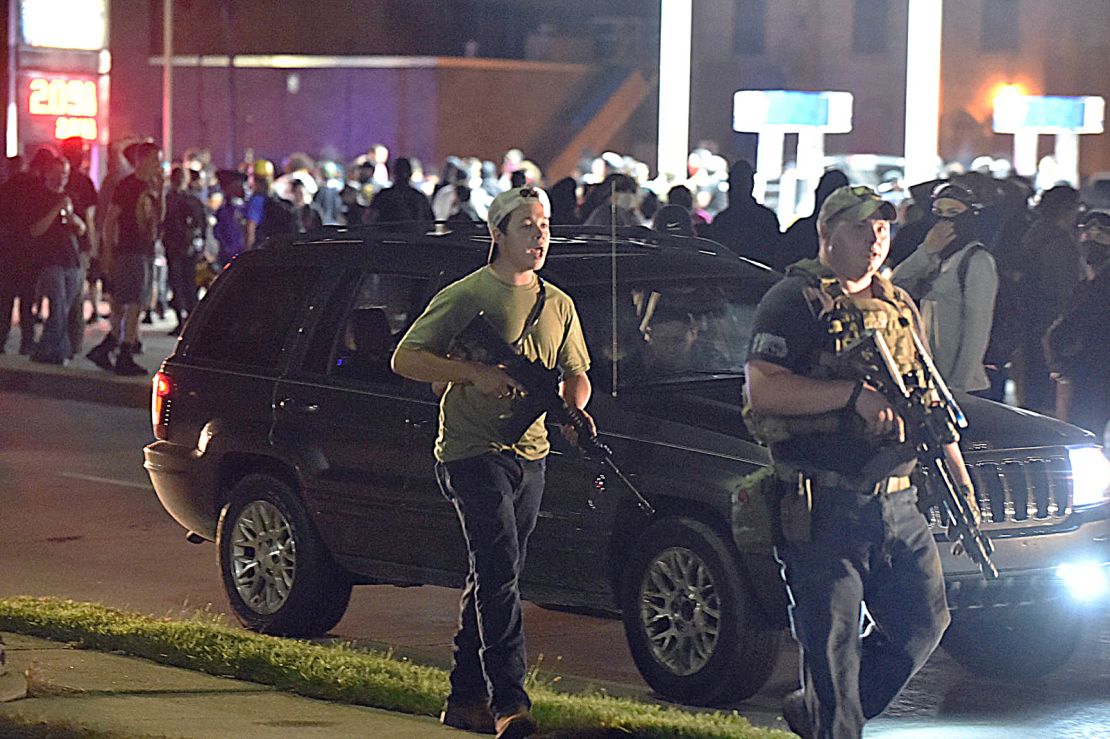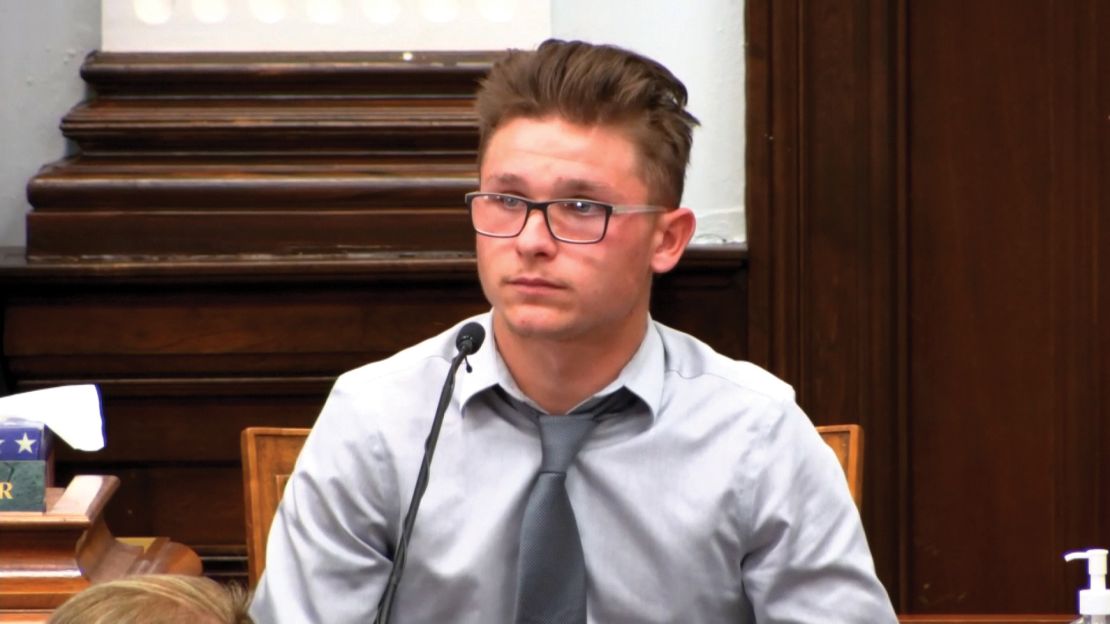Kyle Rittenhouse’s friend testified Tuesday that the armed teenager was “freaking out,” pale and sweaty after he fatally shot two people and wounded another during the unrest in Kenosha, Wisconsin, last summer.
“He said he had to do it, it was self-defense, people were trying to hurt him,” Dominick Black, 20, told a Kenosha courtroom. Black testified that Rittenhouse did not indicate whether anyone had a firearm or knife.
Black, who purchased the weapon Rittenhouse used in the shootings, was the first witness in a trial that will ask jurors to assess the distinction between self-defense and vigilantism.
The trial beganTuesday with opening statements as prosecutors and defense attorneys offered competing versions of what happened last August after the police shooting of Jacob Blake sparked chaotic unrest in Kenosha. Prosecutors portrayed Rittenhouse, 17 at the time, as an aggressor, but his defense attorney said he fired only in self-defense.
The trial will feature a bevy of video showing Rittenhouse’s movements that night, including infrared video filmed from above Kenosha. Most of the facts of what happened on August 25, 2020, are not up for debate – rather, the heart of the trial is the analysis of Rittenhouse’s actions and whether they can be considered “reasonable.”
“It isn’t a whodunit,” defense attorney Mark Richards said.
Rittenhouse, now 18, fired an AR-15-style weapon eight times in all during the unrest: four shots at an unarmed Joseph Rosenbaum, two shots at an unarmed unknown individual, one shot at an unarmed Anthony Huber and one shot at an armed Gaige Grosskreutz, Binger said.
Rosenbaum, 36, and Huber, 26, were killed, and Grosskreutz, now 27, was wounded.
Rittenhouse is charged with five felonies: first-degree intentional homicide, first-degree reckless homicide, attempted first-degree intentional homicide and two counts of first-degree recklessly endangering safety. He is also charged with misdemeanor possession of a dangerous weapon under the age of 18 and a non-criminal violation of failure to comply with an emergency order. He has pleaded not guilty.
The teenager rapidly became a polarizing figure in the country’s pitched partisan battles during last summer’s Black Lives Matter protests, which led to instances of violence in Minneapolis, Atlanta, Philadelphia and elsewhere. Rittenhouse’s presence in Kenosha was also part of what experts warned is a rise in amateur armed paramilitary groups at protests nationwide.
The trial is expected to last just over two weeks, Judge Bruce Schroeder said. A jury of 20 people, made up of 11 women and nine men, was selected Monday, and that number will be reduced to 12 before deliberations begin.
Prosecutors and defense offer rival theories

Kenosha County Assistant District Attorney Thomas Binger delivered the prosecution’s opening statement and said the evidence will show that Rittenhouse chased down Rosenbaum and shot him four times, including a fatal shot to the back.
After Rosenbaum was shot, several people nearby tried to confront a fleeing Rittenhouse, who tripped and fell to the ground. The teenager shot twice at an unidentified person who kicked him; he fatally shot Huber, who charged him holding a skateboard; and he then shot Grosskreutz, who was holding a handgun, in the arm.
Binger described these people as “citizens” trying to stop what they believed to be an active shooter. He also pointed out that Rittenhouse was unique in his actions that night.
“The evidence will show that hundreds of people were out on the streets experiencing chaos and violence and the only person who killed anyone was the defendant Kyle Rittenhouse,” Binger said.
In response, Rittenhouse’s attorney Richards pointed to Rosenbaum as the aggressor, saying he threatened to kill Rittenhouse and chased after the teenager. Rosenbaum was “ultimately the individual who lit the fuse that night,” Richards said.
In addition, Richards described the three men who confronted Rittenhouse as part of a “mob.” Richards relied on a series of videos and images in his opening statement, an indication of the importance of that media to the case.
“He acted in self-defense, ladies and gentlemen,” Richards told the jury. “The evidence will show his actions … were reasonable under the circumstances as they existed that night, being attacked by Mr. Rosenbaum.”
Prosecutors said infrared surveillance video could show that at least at some point during that night, it was Rittenhouse who was following and chasing Rosenbaum. Prosecutors then played grainy black-and-white video taken by FBI agent Brandon Cramin from an airplane 8,500 feet over the protests in Kenosha.
None of the fuzzy figures on the ground were immediately identifiable, according to pool reports. After Schroeder and the attorneys discussed the video, the judge advised prosecutors to skip the FBI agent for now, call different witnesses and come back to the issue of the plane later.
Friend of Rittenhouse’s testifies he bought him firearm

The violence in Kenosha, a city of about 100,000 people, came amid a tense summer of protests and unrest as masses of people denounced how American police treated Black people.
On August 23, 2020, a Kenosha Police officer shot Blake, a 29-year-old Black man, multiple times in the back. The shooting was captured on cellphone video and quickly spread online, and the ensuing public anger and frustration led to incidents of violence and destruction that night and the next night.
Some people took the matter of safety into their own hands. Rittenhouse was among them.
Rittenhouse, from nearby Antioch just across the Illinois border, had an affinity for guns and supported “Blue Lives Matter” and then-President Donald Trump, according to his social media accounts. His father lived in Kenosha and the teenager worked as a lifeguard in the city.
Dominick Black, a 20-year-old friend who was dating Rittenhouse’s sister, testified Tuesday as the first witness in the trial and said he had previously purchased an AR-15 firearm for Rittenhouse.
Rittenhouse was too young to purchase and possess a gun, but he agreed to pay for the firearm, Black testified. Black also had his own firearm, and they had fired the weapons in target practice in a rural area.
On August 25, 2020, Black and Rittenhouse each took a weapon and ammo and went to downtown Kenosha to try to protect a car dealership called Car Source, where about six or seven other armed people had gathered.
Black climbed atop the roof of the dealership that night because he felt being on the ground was too dangerous, he testified. At one point, he heard gunshots go off in the distance at an area where Rittenhouse was.
“I didn’t believe the gunshots were actually his until I got a phone call. I answered it and he just said, ‘I shot somebody, I shot somebody,’ and then hung up right away,” Black testified.
Rittenhouse returned to the dealership “freaking out.” They drove to Rittenhouse’s home in Antioch. Rittenhouse surrendered to police the next morning.
Black has been charged with two counts of intentionally giving a dangerous weapon to a person under the age of 18 causing death, according to court records. He has pleaded not guilty. He testified Tuesday that he hoped taking the stand would lead to leniency in his case.
CNN’s Paul P. Murphy, Carma Hassan, Brad Parks and Faith Karimi contributed to this report.
























